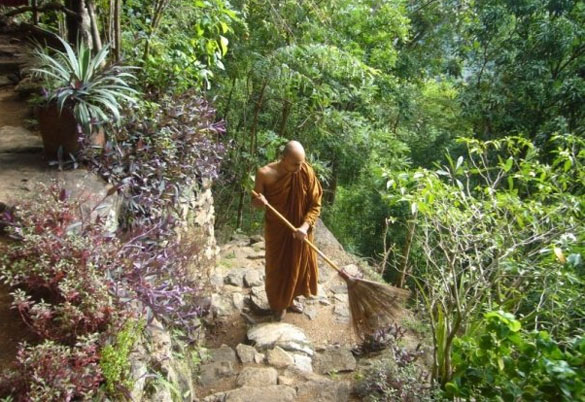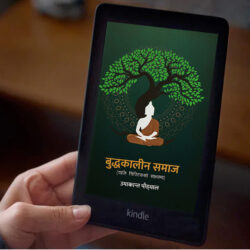The Power of Samādhi

Everything I’ve been relating to you concerns the mind following the way of nature. This was no theoretical description of the mind or of psychological states. There’s no need for that. When there’s faith or confidence, you get in there and really do it. Not just playing around, you put your life on the line. And when your practice reaches the stage that I’ve been describing, after wards the whole world is turned upside down. Your understanding of reality is completely different. Your view is utterly transformed. If someone saw you at that moment, they might think you were insane. If this experience happened to someone who didn’t have a thorough grip on themselves, they might actually go crazy, because nothing is the same as it was before. The people of the world appear differently than they used to. But you’re the only one who sees this. Absolutely everything changes. Your thoughts are transmuted: other people now think in one way, while you think in another. They speak about things in one way, while you speak in another. They’re descending one path while you’re climbing another. You’re no longer the same as other human beings. This way of experiencing things doesn’t deteriorate. It persists and carries on. Give it a try. If it really is as I describe, you won’t have to go searching very far. Just look into your own heart. This heart is staunchly courageous, unshakably bold. This is the heart’s power, it’s source of strength and energy. The heart has this potential strength. This is the power and force of samādhi.
At this point it’s still just the power and purity that the mind derives from samādhi. This level of samādhi is samādhi at its ultimate. The mind has attained the summit of samādhi; it’s not mere momentary concentration. If you were to switch to vipassanā meditation at this point, the contemplation would be uninterrupted and insightful. Or you could take that focused energy and use it in other ways. From this point on you could develop psychic powers, perform miraculous feats or use it anyway you wanted. Ascetics and hermits have used samādhi energy for making holy water, talismans or casting spells. These things are all possible at this stage, and may be of some benefit in their own way; but it’s like the benefit of alcohol. You drink it and then you get drunk.
This level of samādhi is a rest stop. The Buddha stopped and rested here. It forms the foundation for contemplation and vipassanā. However, it’s not necessary to have such profound samādhi as this in order to observe the conditions around us, so keep on steadily contemplating the process of cause and effect. To do this we focus the peace and clarity of our minds to analyze the sights, sounds, smells, tastes, physical sensations, thoughts, and mental states we experience. Examine moods and emotions, whether positive or negative, happy or unhappy. Examine everything. It’s just like someone else has climbed up a mango tree and is shaking down the fruit while we wait underneath to gather them up. The ones which are rotten, we don’t pick up. Just gather the good mangoes. It’s not exhausting, because we don’t have to climb up the tree. We simply wait underneath to reap the fruit.
Do you get the meaning of this simile? Everything experienced with a peaceful mind confers greater understanding. No longer do we create proliferating interpretations around what is experienced. Wealth, fame, blame, praise, happiness, and unhappiness come of their own accord. And we’re at peace. We’re wise. It’s actually fun. It becomes fun to sift through and sort out these things. What other people call good, bad, evil, here, there, happiness, unhappiness, or whatever – it all gets taken in for our own profit. Someone else has climbed up the mango tree and is shaking the branches to make the mangoes fall down to us. We simply enjoy ourselves gathering the fruit without fear. What’s there to be afraid of anyway? It’s someone else who’s shaking the mangoes down to us. Wealth, fame, praise, criticism, happiness, unhappiness, and all the rest are no more than mangoes falling down, and we examine them with a serene heart. Then we’ll know which ones are good and which are rotten.
***
If people want to talk a lot about theory that’s their business. But no matter how much it’s debated, the practice always comes down to this single point right here. When something arises, it arises right here. Whether a lot or a little, it originates right here. When it ceases, the cessation is right here. Where else? The Buddha called this point the ”Knowing.” When it knows the way things are accurately, in line with the truth, we’ll understand the meaning of mind. Things incessantly deceive. As you study them, they’re simultaneously deceiving you. How else can I put it? Even though you know about them, you are still being deluded by them precisely where you know them. That’s the situation. The issue is this: it’s my opinion that the Buddha didn’t intend that we only know what these things are called. The aim of the Buddha’s teachings is to figure out the way to liberate ourselves from these things through searching for the underlying causes.
By Monk Ajan Chah. Chah is an influential teacher of the Buddha Dhamma (in Thailand) and a founder of two major monasteries in the Thai Forest Tradition.







